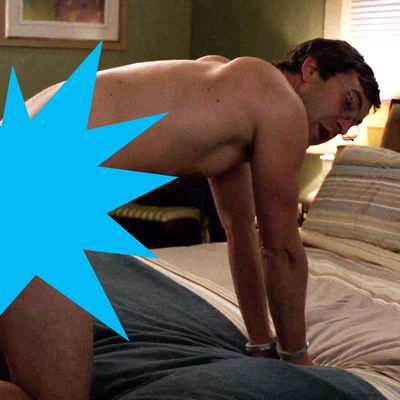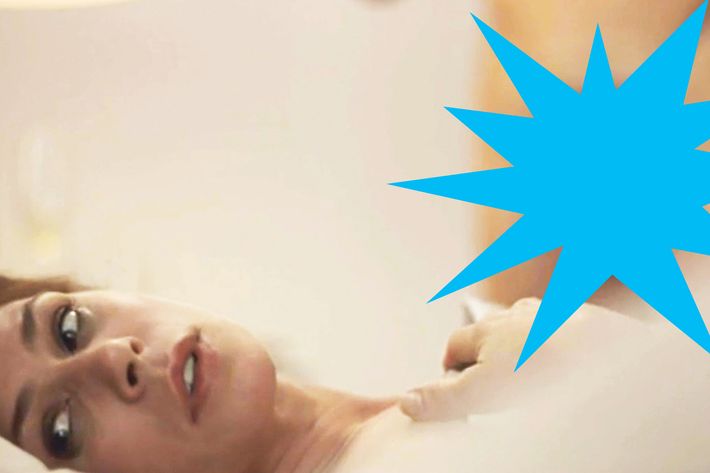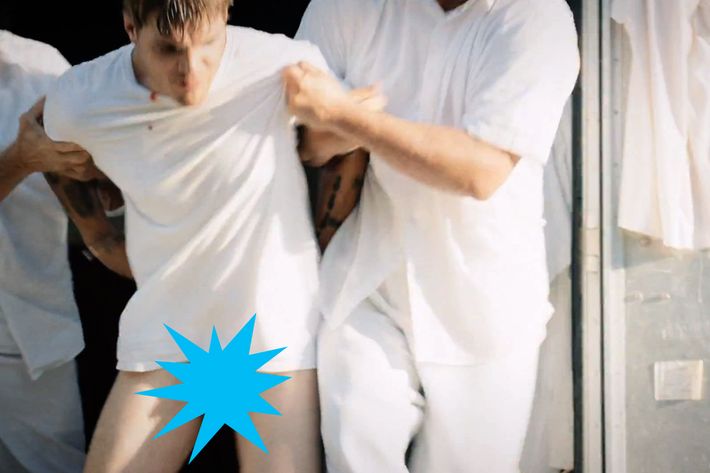
This summer, Kevin Bacon released a mock PSA calling on Hollywood’s male actors to “free [their] bacon.” “And by bacon,” he clarified, “I mean your wiener, your balls, and your butt.” It was a gentle ribbing of the fact that show business is still more comfortable asking women to disrobe than men.
In 2015, that norm quietly began to budge, though not as wantonly as Bacon recommended. This fall, Chris Zylka and Christopher Eccleston stripped down in different episodes of HBO’s The Leftovers. Ben Daniels used his bare penis in an act of aggression on Flesh and Bone. Outlander’s Tobias Menzies didn’t bother with a “modesty pouch.” Sense8, Shameless, Togetherness, The Affair, Black Sails, and Penny Dreadful all featured men who bared it all. While there are more instances than ever to point to this year, male nudity has certainly existed in previous decades on premium cable, the only on-air platform where full-frontal is allowed. Shows like HBO’s Oz, Boardwalk Empire, Sex and the City, Starz’s Spartacus, and Showtime’s Weeds have gradually been destigmatizing onscreen male genitalia.
“People are becoming more and more comfortable with their sexuality,” says Nancy Pimental, executive producer of Shameless, which featured full-frontal male nudity in its pilot in 2011. “On our show, we’ve made nudity just part of the characters’ lives, as opposed to, all right, where can we put some cock in this episode? That’s never a conversation. Ever.”
The small uptick is hardly a corrective to exploitative female nudity. There’s still a crucial distinction in this recent crop of shows: When men undress, it’s for artistic reasons, not salacious ones. If there is a poster child for female exposure, it’s Game of Thrones. The HBO show uses nude women in so many scenes, it’s been the subject of countless think pieces, and a Saturday Night Live skit in which a 13-year-old boy handles the show’s casting.
Traditionally, the male-dominated TV industry has been more inclined to show breasts, whether its mandated by the cable network or because “male showrunners like to watch boobs more than they like to watch male parts,” says Mark Duplass, star and co-creator of HBO’s Togetherness. “We would be ignorant if we didn’t at least raise that part of the issue.” But increasingly for both men and women on premium cable, the decision to feature nudity is one made by showrunners to serve the character, not the audience.
Earlier this year, Duplass stripped down in a scene on Togetherness with his onscreen wife, Melanie Lynskey. “We have this sort of ongoing joke that we like to represent ‘balls equality’ in nudity, which to us is, any time a pair of boobs or a vagina comes out, we should be willing to pull out some frank and beans to match,” he explains. “This is particularly important on a show like Togetherness that has four equal lead roles — two men and two women. [It’s] less about making something sexy and brilliant that you can masturbate to, and more about showing in an honest way what the bedroom looks like and what relationships look like.”

The Affair’s second-season premiere made headlines this fall when Helen (Maura Tierney) sleeps with her college friend, Max (Josh Stamberg), and is afterwards turned off by the sight of his penis. “Some found it thrilling, and others thought we were attention-grabbing,” co-creator Sarah Treem recalls. “That speaks to how rarely you see male genitalia onscreen. I read articles online in French about ‘the scene that shocked America!’ They’re making fun of us. There’s a puritanical part of this culture that perhaps seems a little immature to the rest of the world.” Damon Lindelof, co-creator and executive producer of HBO’s The Leftovers, adds that the lack of male genitalia on television creates an arbitrary distinction, as if “the fine line between art and porn is seeing a guy’s dong. That’s what our culture has decided.” This has its advantages, Treem says. “I love it as a storyteller,” she laughs. “Our desires are so hidden — we’re so whitewashed in terms of what we think is acceptable behavior, which allows for great storytelling potential, even if it makes life itself a little bit miserable.”
Producers on shows where nudity is more commonplace, such as Shameless and Game of Thrones, gauge an actor’s comfort with undressing during auditions and require that all hired actors sign clauses in their contracts stating they are willing to be naked on camera. But, legally, an actor reserves the right to change his or her mind moments before a scene is filmed, according to Screen Actors Guild rules. Shows that feature nudity less frequently handle it on a case-by-case basis with the actor.
Depending on whom you talk to, philosophies on stripping down vary. Pimental notes that male nudity is inherently a more sensitive proposition. “We feel protective of the guy — is he going to get erect? It’s a big exposure,” she explains. “With women, you’re really just seeing boobs and pubic hair. You’re not getting all in there unless it’s porn. With a guy, it’s game on.” Penises “are kind of sacred,” Treem agrees. “To really break it down, what we’re comfortable seeing is women’s breasts and men’s asses — I don’t think we’re comfortable with full-frontal on anybody. “If it were up to me, everybody would be naked. But it’s not up to me because I’m not the one that has to do it.”
For Lindelof, it comes down to aesthetics. If a man is nude on camera, he believes the viewer should see his penis, even if it’s just for a couple of seconds. He felt that way about a scene this season on The Leftovers, in which Meg (Liv Tyler) rapes Tom (Chris Zylka). In a discussion with episode director Carl Franklin, Lindelof says he didn’t feel Tom’s nudity needed to be highlighted, but it also shouldn’t be hidden either. “This is a gut judgment,” Lindelof explains. “Sensitivity is important, but the key question I try to ask myself is: Why is there nudity in the scene, and what’s it for? In this case, it’s being used to express vulnerability. So how much do I need to show before it becomes gratuitous?” They left it up to Zylka, who was comfortable being nude from the waist down.

In the Leftovers episode “No Room at the Inn,” it was actor Christopher Eccleston who decided he should undress completely. His character, Matt, trades places with a man who is paying for his sins by passing the days in Colonial-style stocks. “Chris emailed me and said he thought it would be more powerful if he stripped naked,” Lindelof says. “I completely agreed, but editorially, we used the amount of nudity I felt was important to tell the story and nothing more.”
Jeff Reiner, executive producer and director of The Affair, felt strongly about showing Max’s privates in the premiere. “I thought the moment, honestly, could work even if she just looks over and we’re shooting that from behind and we know she’s looking directly at his penis,” Treem says. “But Jeff insisted on it. He said, ‘We show female nudity every day on the show — let’s show male nudity.’”
Veteran TV producer Tom Fontana was a pioneer of sorts in this area. The creator of Oz, the first cable series to feature male nudity regularly, wanted his show to be an authentic take on prison life, which often involved scenes of prisoners in solitary confinement, in the nude. The show — which was also HBO’s first original drama — premiered almost 20 years ago, but Fontana says he had the network’s full support to portray the inmates how he needed. He emphasized that when it comes to going whole hog, directors need to respect an actor’s limits.
One prisoner on Oz, a drug dealer played by Adewale Akinnuoye-Agbaje, was often filmed naked, using his large physicality to intimidate others. “There was a scene where he was supposed to take out his penis and sort of use it like a ‘fuck you’ thing,” Fontana recalls. “And we were on the set, and we were getting to shoot the scene, and Adewale comes to me and he says, ‘You know, Tom, I’ve been thinking about it, and I don’t think I would take my penis out in this scene.’ Now, this is a guy who had never resisted taking his penis out in any other scene. I say, ‘Hey, you know what, Adewale, if you don’t want to take your penis out in this scene, don’t take your penis out. The scene will play either way.’ So we shoot, and he doesn’t take his penis out, and we move on to the next scene, which he’s also in. And in that scene, where it wasn’t scripted to take his penis out, he took his penis out. So, sometimes an actor can be hesitant to take his penis out, and sometimes just feel inspired to take his penis out.”
Even as showrunners like Treem, Fontana, and Duplass are narrowing the gender gap, we’re still a long way from parity. “There is a tremendous amount of female nudity out there in popular culture,” Lindelof says, “and it doesn’t make any sense that there isn’t enough male nudity.” Duplass takes it further: “If I’m asking Amanda Peet and Melanie Lynskey to be naked, I better be damn willing to do it myself.”
*A version of this article appears in the December 28, 2015 issue of New York Magazine.

